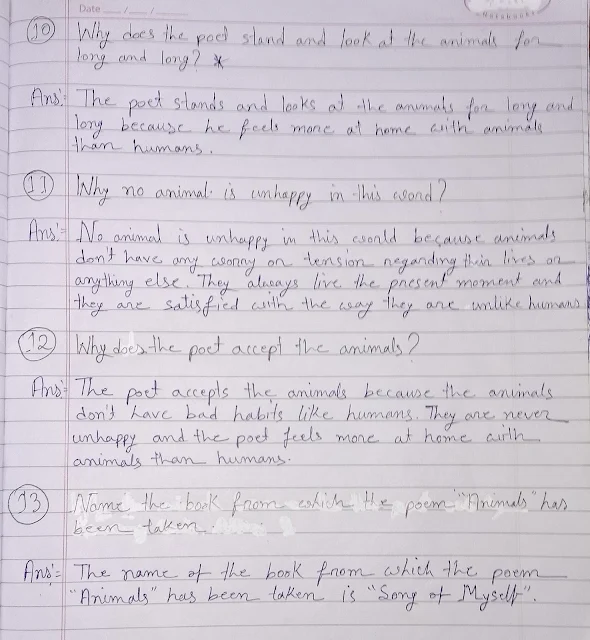Animals by Walt WhitmanClass 10 Poem Questions and Answers
Short Answer Type Questions:
Q1. Who is the poet of the poem "Animals"?
Ans: The poet of the poem "Animals" is Walt Whitman.
Q2. What does the poet wish to live with in the poem "Animals"?
Ans: The poet wishes to live with animals because they are calm, self-contained, and free from the vices that humans possess.
Q3. How are animals different from humans, according to the poet?
Ans: According to the poet, animals are different from humans because they do not complain about their condition, do not suffer from greed, and live a simple and content life without unnecessary desires.
Q4. What human qualities does the poet dislike?
Ans: The poet dislikes human qualities such as greed, selfishness, false worship, dissatisfaction, and hypocrisy.
Q5. What is the central theme of the poem "Animals"?
Ans: The central theme of the poem is that animals are superior to humans in their behavior. They are more content, honest, and peaceful, unlike humans who are never satisfied and are driven by greed and ego.
Long Answer Type Questions:
Q6. Why does the poet feel more comfortable with animals than humans?
Ans: The poet feels more comfortable with animals because animals are calm, self-contained, and peaceful. Unlike humans, animals do not suffer from greed, dissatisfaction, and hypocrisy. They live a simple life, are satisfied with what they have, and do not indulge in unnecessary materialistic desires. On the other hand, humans are always complaining, jealous, and restless. The poet admires the simplicity and honesty of animals and wishes to live among them.
Q7. How do animals show that they are better than humans in the poem?
Ans: Animals show that they are better than humans through their behavior. They do not complain about their lives, do not weep for their sins, and are not obsessed with material possessions. They live in peace and harmony with nature. Animals are also free from the greed and selfishness that humans often display. They do not need to worship God or follow rituals to prove their worthiness. Their contentment and simplicity prove that they are morally and spiritually superior to humans.
Q8. What message does Walt Whitman want to convey through the poem "Animals"?
Ans: Through the poem "Animals," Walt Whitman wants to convey that human beings have lost their innocence, simplicity, and contentment due to greed and materialism. He contrasts humans with animals, who live a peaceful and honest life. The poet urges humans to learn from animals and adopt qualities like contentment, honesty, and simplicity to lead a more fulfilling life.
Extract-Based Questions:
Q9. Read the following extract and answer the questions that follow:
"They do not sweat and whine about their condition,
They do not lie awake in the dark and weep for their sins,
They do not make me sick discussing their duty to God."
(a) Who is 'they' referred to in the extract?
Ans: 'They' refers to animals.
(b) What human qualities are being criticized by the poet?
Ans: The poet criticizes human qualities like complaining, dissatisfaction, and the habit of pretending to be moral or religious.
(c) How are animals different from humans, according to this extract?
Ans: According to this extract, animals do not complain about their lives, do not cry over their mistakes, and do not fake their devotion to God, unlike humans.
Q10. Read the following extract and answer the questions that follow:
"Not one is dissatisfied, not one is demented with the mania of owning things,
Not one kneels to another, nor to his kind that lived thousands of years ago."
(a) What does the poet mean by 'mania of owning things'?
Ans: The phrase 'mania of owning things' refers to the greed and obsession of humans to accumulate material possessions.
(b) How are animals different from humans in terms of worship?
Ans: Animals do not worship other animals or ancestors like humans do. They live a self-sufficient life without bowing down to others.
(c) What does the poet imply about human society?
Ans: The poet implies that human society is corrupted by greed, materialism, and blind faith. Humans are never satisfied with what they have and are always obsessed with wealth and possessions.
Multiple Choice Questions (MCQs):
Who is the poet of the poem "Animals"?
(a) Robert Frost
(b) Walt Whitman
(c) William Wordsworth
(d) John Keats
Ans: (b) Walt WhitmanWhat quality of animals does the poet appreciate?
(a) Their greed
(b) Their dissatisfaction
(c) Their contentment
(d) Their ignorance
Ans: (c) Their contentmentWhat does the poet criticize in human beings?
(a) Honesty
(b) Innocence
(c) Greed and dissatisfaction
(d) Loyalty
Ans: (c) Greed and dissatisfactionWhich phrase in the poem shows that animals are free from materialism?
(a) "They do not sweat and whine about their condition"
(b) "They are demented with the mania of owning things"
(c) "They bring tokens of themselves"
(d) "They do not kneel to another"
Ans: (b) "They are demented with the mania of owning things"What does the poet find sickening in humans?
(a) Their love for animals
(b) Their constant complaining
(c) Their intelligence
(d) Their kindness
Ans: (b) Their constant complaining
 |












